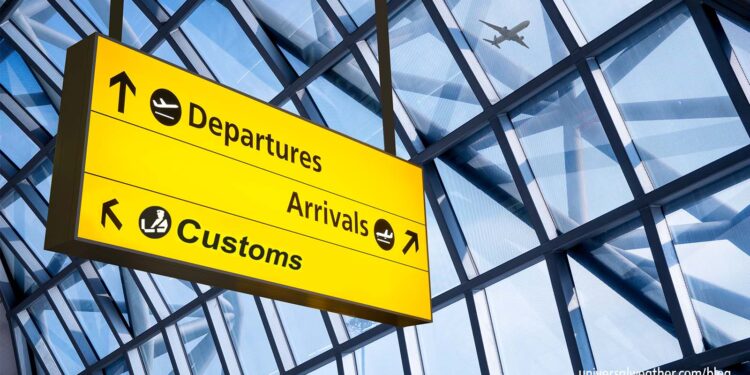Customs Tips for Any Trip: Part 1 – Avoiding Issues on your Trip

This business aviation blog post is part of a series on customs, immigration, and quarantine tips for your international travel.
Customs, immigration, and quarantine (CIQ) authorities worldwide, are becoming more stringent on clearance requirements. Be mindful that every airport location can be somewhat unique in terms of CIQ requirements and procedures–even at airports within the same country. For business aircraft operators, “know before you go” is always the best policy in terms of avoiding delays, issues, and potential repercussions when entering/leaving a country.
The following is an overview of what you need to know:
1. Send passenger/crew information in advance
It’s always recommended to send complete passenger and crew information to your ground handler prior to your flight. Always ensure that this information is correct and that the manifest matches the general declaration (gen dec). This will help your ground handler to complete documentation, including arrival/departure cards, in advance so the CIQ process isn’t delayed.
2. Passport validity
Every country has passport validity requirements, but these vary. In most cases you’ll need three to six months remaining validity on passports at time of entry. China and the Philippines, for example, want to see six months validity while Germany mandates a minimum of three months. At other destinations you may only require passport validity to cover your length of stay. It’s recommended that passport validity policies be confirmed prior to any international operation.
3. Visa considerations
Visa requirements/regulations vary, depending upon the country and nationality of the visitor, and policies tend to change from time to time. Many countries require that you have visas on arrival. Some locations will allow you to obtain visas on arrival, but these usually have restricted validities – perhaps 72 hours to seven days – and could present issues should you need to stay longer in-country. For example, China allows passengers, but not crew, a 72-hour transit visa at Beijing and Shanghai, but there are still considerations/restrictions to be mindful of. In general, obtaining visas on arrival, when they’re available, tends to slow the inbound arrival process–therefore it’s not recommended for general aviation (GA) operations. Operators should be aware that there are cases where it’s taken two to three hours to organize visas on arrival.
4. Crew visas and “shore passes”
In certain cases, depending upon destination and crew nationality, crewmembers listed on the gen dec may enter the country without visas. They’re issued a type of “shore pass.” While this works well in in certain countries, there are considerations and additional steps to consider when a crewmember arrives aboard a GA flight but departs on a commercial carrier or vice versa.
5. Location for clearing CIQ
It’s important to know where you’ll clear CIQ as this varies from airport to airport. At some airports you may clear within a fixed-base operator (FBO) or general aviation terminal (GAT) with advance arrangement. At other locations you’ll clear in the main commercial terminal along with scheduled commercial passengers. In other cases, although this is less common, you may be able to clear CIQ onboard your aircraft. For diplomatic and/or air ambulance flights you’ll often have the option of clearing CIQ onboard the aircraft, but prior arrangement for this is needed.
At certain locations, including the Cape Verde Islands, China and Mexico, dogs may be brought to your aircraft to confirm that no illegal substances are onboard.
6. Pets onboard
When traveling with pets always confirm, in advance, what local requirements are for temporary importation of domestic animals. Most countries require, at minimum, a current vaccination record and health certificate, but some locations also want to see a “pet passport” or that the pet is micro chipped with health records. Some countries are particularly stringent on pet requirements. In the case of Japan, a pet may be put under quarantine for 90 days upon arrival. Some locations mandate that the animal be checked by a local vet on landing. Other countries, including the UK, only allow pets to enter at certain designated airports, with appropriate approvals obtained in advance. The type of pet you’re carrying will also be a factor. In the UK, for example, you’re permitted to bring in a dog, cat or ferret, but other animals aren’t permitted. More information on pet travel can be found on our articles “Pet Passport Travel – Now Available at London Stansted Airport (EGSS)” and “Practical Considerations When the Fur Flies: Flying with Pets in Business Aviation.”
7. Weapons are restricted
CIQs have differing requirements in terms of weapons aboard arriving GA aircraft. Prior permission and specific arrangements are always necessary in this regard. In some countries weapons are not permitted, even for tech stops. Other countries may allow temporary importation of certain weapons if they’re properly licensed and prior approval has been obtained. At some airports, however, weapons may need to be held in a customs locker until the aircraft departs. For hunting trips some destinations require that you have licenses, provide type and serial numbers of weapons and hunting lodge permits.
8. CIQ hours of operation & charges
CIQ hours often, but not always, mirror airport operating hours. San Juan (TJSJ), for example, is open 24 hours, but customs is only available 0800-2359 local with no overtime. In cases where CIQ overtime is available advanced arrangements need to be made. There may also be blackout periods to consider. At Manaus (SBEG), for example, GA traffic is not processed during busy periods of scheduled commercial operations. It’s also important to determine if CIQ fees are applicable and if your ground handler can extend credit for this. At some international locations, including Koror (PTRO), cash payment for CIQ services is expected; however, your ground handler may be able to establish credit.
Conclusion
Always have a checklist of items to be verified prior to making international arrivals/departures. Double check visa requirements, passport validity, agricultural restrictions, CIQ and overtime availability and clearance lead time requirements well before day of operation.
Questions?
If you have any questions about this article or would like assistance planning your CIQ arrangements for your next trip, contact me at rayburnhoover@univ-wea.com.
Stay tuned for Part 2, which covers information you need to remain compliant with CIQ regulations.




